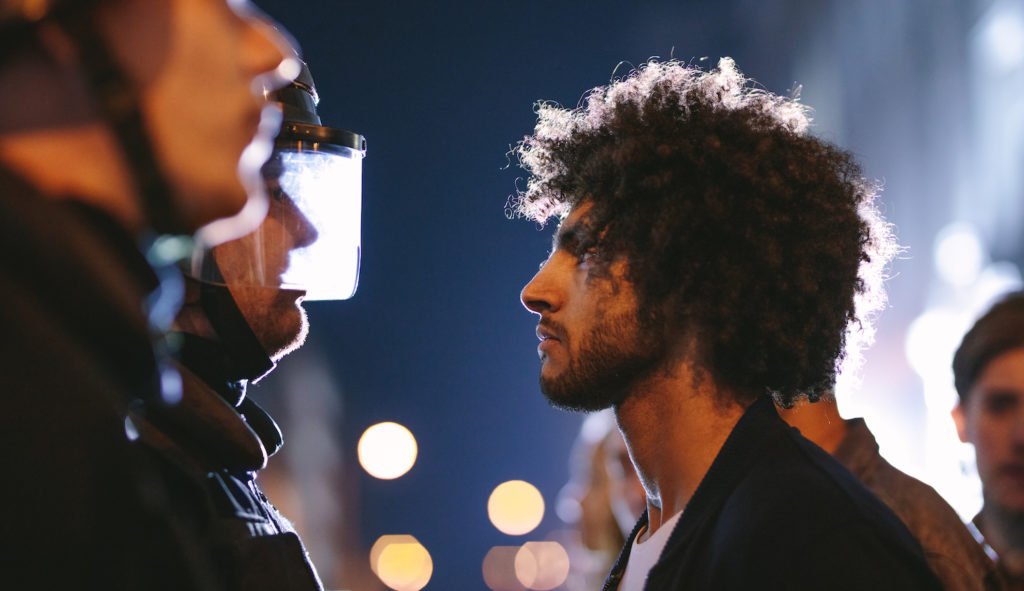CRS 18-9-108 is the Colorado law that makes it a petty offense to interfere intentionally with or obstruct a gathering of people. The punishment for disrupting a lawful assembly is typically
- $50 to $750 in fines and/or
- up to 6 months in jail.
But if the event is a funeral, it is a misdemeanor punishable by
- $250 to $1,000 in fines and/or
- 3 months to 12 months in jail.
The language of Section 18-9-108 CRS reads as follows:
(1) A person commits disrupting lawful assembly if, intending to prevent or disrupt any lawful meeting, procession, or gathering, he significantly obstructs or interferes with the meeting, procession, or gathering by physical action, verbal utterance, or any other means.
(2) Disrupting lawful assembly is a petty offense; except that, if the actor knows the meeting, procession, or gathering is a funeral, it is a class 2 misdemeanor.
In this article, our Colorado criminal defense lawyers will address:
- 1. What is disrupting a lawful assembly in Colorado?
- 2. How severe are the penalties?
- 3. How can a defense attorney fight the charges?
- 4. Can defendants be deported?
- 5. How soon can the record be sealed?
- 6. Related Offenses

Many lawful protesters get wrongly arrested for disrupting a lawful assembly.
1. What is disrupting a lawful assembly in Colorado?
Under CRS 18-9-108, “disrupting a lawful assembly” is defined as significantly obstructing or interfering with a legally assembled meeting or gathering of people. Examples of a lawful assembly include a:
- city council meeting,
- school assembly,
- church meeting, or
- campaign rally
Examples of disrupting a lawful assembly include:
- shouting during political speeches,
- interrupting or drowning out a conference speaker, or
- using a noise machine while a campaigner is trying to speak1
Protests are perfectly legal in Colorado. But demonstrators violate CRS 18-9-108 when they interrupt another event or meeting:
Example: During a “right-to-die / euthanasia” conference in Denver, several protesters infiltrate the meetings and use megaphones to shout down all the speakers so that no one can hear what they are saying. Since the protesters are significantly interfering with the conference, they could be arrested for interfering with a legal assembly.
Had the protesters in the above example just congregated outside the conference hall without interrupting the meetings inside, then they would have escaped criminal liability.
2. How severe are the penalties?
In most cases, disrupting a lawful assembly in Colorado is a petty offense. The punishment includes:
- Up to $300 in fines, and/or
- Up to 10 days in jail
However, disrupting a funeral is a class 2 misdemeanor. This sentence is:
- Up to $750 in fines, and/or
- Up to 120 days in jail time2

CRS 18-9-108 prohibits people from verbally, physically, or otherwise disrupting a legal meeting in Colorado.
3. How can a defense attorney fight the charges?
A criminal defense attorney would compile all the evidence available to demonstrate that the defendant did not knowingly violate CRS 18-9-108 – or that there is insufficient proof to convict. Typical evidence includes:
- surveillance video,
- spectators’ smartphone videos, and
- eyewitness accounts
Especially when there are big crowds, innocent bystanders may fall prey to mistaken identification and get wrongfully arrested. And sometimes, police knowingly arrest lawful protesters just to put an end to the demonstration.
4. Can defendants be deported?
A conviction for interfering with a lawful meeting will probably not threaten an immigrant defendant’s resident status in the United States. That being said, immigration law is in a state of flux. An experienced criminal defense attorney can assess the deportation risk and try to persuade the prosecutor to reduce or dismiss the charges.
5. How soon can the record be sealed?
Petty offense convictions may be sealed one (1) year after the case closes. Class 2 misdemeanor convictions can be sealed two (2) years after the case closes. But there is no waiting period to get a seal if the charges get dismissed.3
Learn how to get a Colorado criminal record sealed.
6. Related Offenses
Loitering
It is a petty offense in Colorado to loiter within 100 feet of a school when anyone under 18 is present or the defendant has been asked to leave by school administrators. The penalties for loitering near a school (CRS 18-9-112) include up to 10 days in jail and/or a fine of up to $300.
Rioting Offenses
Engaging in a riot (CRS 18-9-104) and inciting a riot (CRS 18-9-102) are criminal offenses, with possible misdemeanor or felony charges, depending on the types of actions alleged and whether a weapon was involved. Felony engaging in a riot can result in 2 to 6 years in prison and a fine of up to $500,000.
Disorderly Conduct
Disorderly conduct (CRS 18-9-106) in Colorado includes making coarse and offensive gestures, displays, or utterances that tend to incite an immediate breach of the peace. This includes fighting, making unreasonable noise, or discharging a firearm in public. Disorderly conduct can be charged as a petty offense or misdemeanor, depending on the conduct involved.
Obstructing highways or passageways
Obstructing highways or passageways (CRS 18-9-107) is intentionally, knowingly, or recklessly obstructing any roadway or passageway the public can access. The penalties are the same as for disrupting a lawful assembly.
Legal References
- CRS 18-9-108; see Dempsey v. People, 117 P.3d 800 (Colo. 2005)(“[T]he statute…focuses on the conduct of the defendant -not the content of his speech.”).
- Same. Prior to March 1, 2022, this crime was usually a class 3 misdemeanor, carrying $50 to $750 in fines and/or up to 6 months in jail. Class 2 misdemeanors carried $250 to $1,000 in fines and/or 3 to 12 months in jail. SB21-271.
- CRS 24-72.
